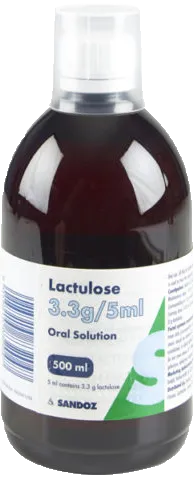
Images are for illustration purposes only.
Lactulose Solution
Available size:
Price £7.20
Expected Delivery: Tuesday, 30 December 2025
Why choose Click Pharmacy?
- Rated 'Excellent' on Trustpilot
- UK Registered Pharmacy
- Price Match Guarantee
GPhC Internet Pharmacy Registration
UK Pharmacy Registration Number 9011460
Lactulose Solution targets constipation by softening stools and regulating bowel movements. It is a synthetic sugar solution with natural laxative properties that helps draw water from the body into your intestines, which makes stool softer and easier to pass. It can be used to relieve severe or chronic constipation. This formula works over time (within 1-2 days) and should not be used as a quick fix.
Lactulose Solution should only be used as prescribed by your doctor or pharmacist. General instructions are as followed:
-
This medicine is suitable for children, adults and pregnant and breastfeeding women.
-
For adults, 5ml spoonfuls three times a day is recommended.
-
For children between the ages of 5-10, 5ml spoonfuls two times a day is recommended.
-
For children between the ages of 1-5, 5ml spoonful a day is recommended.
- For babies under 1 year old: 2.5ml spoonful twice a day is recommended.
Drink a lot of water and incorporate plenty of fluid in your diet when using Lactulose Solution to keep the body hydrated and help ease the symptoms of constipation.
-
Use only as directed by your doctor.
-
If symptoms persist, consult your doctor.
-
Consistent use for a long period of time can be harmful.
-
Consult doctor before use if you are pregnant, planning to get pregnant or breastfeeding.
-
Consult your doctor before use if you suffer from galatosaemia or require a galatose-free diet, are diabetic or have gastro-intestinal obstruction.
-
Discontinue use if you are allergic to any of the ingredients mentioned on the packaging of Lactulose Solution.
-
Do not use if the product is expired.
-
Keep out of reach of children.
-
Store in a cool, dry place.
Can children use Lactulose Solution?
Lactulose Solution is not suitable for children under the age of 14 years old. However in some cases it has been prescribed to children under the age of 14 years old.
Who should not use Lactulose Solution for treating symptoms of constipation?
Although Lactulose Solution does not usually cause any harm, it is not suitable for everyone to use. You should not use Lactulose Solution if you have any of the following:
- Lactose intolerance
- Galactosaemia
- Diabetes
What is the difference between Lactulose Solution and Duphalac?
While both Lactulose and Duphalac are used for the treatment of constipation, the main difference is branding. Duphalac is the branded version of Lactulose making it cost more.
How should I measure the right amount of Lactulose Solution?
You should use the plastic cup provided with the medication to measure out the correct amount of solution.
Can I drink alcohol while taking Lactulose Solution?
Yes, it is safe to drink alcohol with Lactulose Solution. There is no evidence to suggest that alcohol interferes with the way Lactulose Solution works.
Lactulose Solution contains the following ingredients:
Active ingredients: Lactulose 3.35g
Also contains: Lactose and Galactose
Lactulose Solution Reviews
Expected Delivery: Tuesday, 30 December 2025